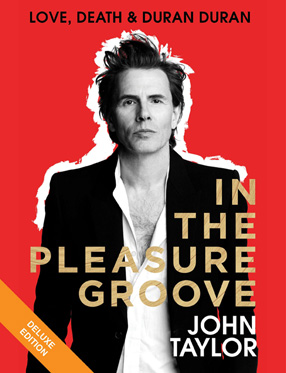You’d figure that if any member of Duran Duran (besides lead singer Simon Le Bon) was to write a book, it would have to be John Taylor, right? The bassist for the legendary pop band seemed (again, after Simon) the most personable of the members, and with his air of detached cool and matinee idol looks, scored the attention of much of DD’s sizable female fan base back in the day. So, John’s memoir, In the Pleasure Groove, is not a surprising development. But it is a surprisingly easy read, and an enjoyable one too.
John’s story is, more or less, the typical one for a rock star. Growing up in England and coming of age in the early Seventies, he fell in love with David Bowie and Roxy Music, and dreamed of becoming a famous musician. Within a decade, he was selling out arenas, appearing on the cover of magazines, and making time with more than his fair share of women. He was also nursing a serious drug problem, and abused cocaine and ecstacy for close to a decade and a half. While he never did anything stupid like wrap a car around a tree or impregnate a groupie, he participated in his fair share of mid-level rock star debauchery. After all, it was the ’80s.
What I find more interesting than John’s life story is the fact that there’s finally a first-person account of Duran Duran’s career, which is now in its fourth decade. Of course, John also talks in detail about his “side projects”- supergroups The Power Station and The Neurotic Outsiders. John takes great pains to not throw much shade-the book is somewhat surprisingly not bitchy. However, there are definitely people on his shit list. This would include Duran’s former/current/former guitarist Andy Taylor as well as Sterling Campbell, AKA the Black Durannie. Campbell’s brief tenure as a member of Duran Duran (he appears on 1990’s Liberty) is finally explained within the confines of In the Pleasure Groove. There’s also a bit of animosity towards Duran’s original management team. On the other hand, John is obviously fond of the other Duran members, and also spends much of his time giving props to his heroes like Bowie and Chic’s Nile Rodgers and Bernard Edwards, both of whom became running buddies (and Pleasure Groove is a pretty decent companion piece to Rodgers’ 2012 memoir, Le Freak.)
John’s writing style is mellow and conversational. He’s not trying to be an intellectual, he’s just trying to tell a story. In the Pleasure Groove reads like the rare rock star bio that wasn’t ghostwritten or dictated to (and transcribed by) someone else. The chapters are bite-sized and easily digestible, and I zipped through the entire book in a couple of days. While there are no major revelations made here, In the Pleasure Groove is a worthwhile read for anyone who is a Duran fan, or just misses the ’80s and all its excess!
Grade: B

